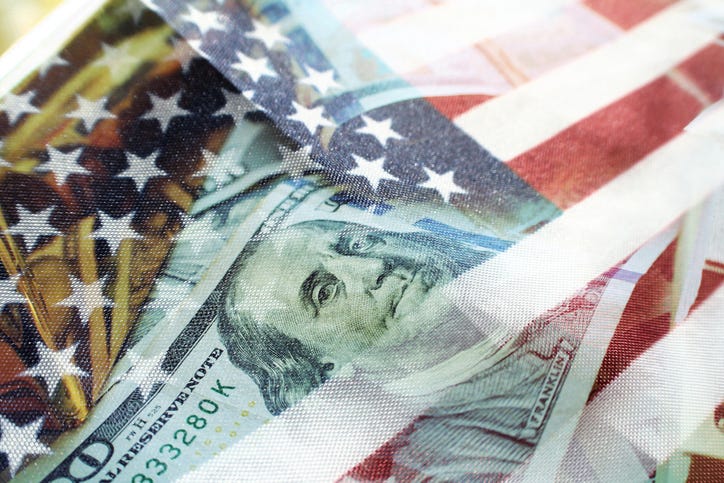
You know the scene in "Charlie and the Chocolate Factory," where Charlie and Grandpa Joe drink the mysterious Fizzy Lifting Drinks and they float higher and higher up to the ceiling where a gigantic fan is all but sure to slice them into pieces? That's how close the U.S. is to hitting the debt ceiling.
Treasury Secretary Janet Yellen on Monday sent a letter to Congress, warning lawmakers that the U.S. could default on its debt as early as June 1 if the $31.381 trillion debt ceiling isn't raised.
"After reviewing recent federal tax receipts, our best estimate is that we will be unable to continue to satisfy all of the government's obligations by early June, and potentially as early as June 1, if Congress does not raise or suspend the debt limit before that time," Yellen wrote.
"We have learned from past debt limit impasses that waiting until the last minute to suspend or increase the debt limit can cause serious harm to business and consumer confidence, raise short-term borrowing costs for taxpayers, and negatively impact the credit rating of the United States," she continued. "If Congress fails to increase the debt limit, it would cause severe hardship to American families, harm our global leadership position, and raise questions about our ability to defend our national security interests."
According to the Treasury Department, the debt limit is "the total amount of money that the United States government is authorized to borrow to meet its existing legal obligations, including Social Security and Medicare benefits, military salaries, interest on the national debt, tax refunds, and other payments."
The debt limit does not authorize new spending commitments, but it allows the government to finance existing legal obligations that Congresses and presidents of both parties have made in the past.
"Failing to increase the debt limit would have catastrophic economic consequences. It would cause the government to default on its legal obligations – an unprecedented event in American history. That would precipitate another financial crisis and threaten the jobs and savings of everyday Americans – putting the United States right back in a deep economic hole, just as the country is recovering from the recent recession," according to the Treasury Department.
This is the second time in recent months that Yellen has warned Congress about the debt limit. In January, she told lawmakers that the Treasury Department was resorting to "extraordinary measures" to avoid a federal government default.
At the same time, the Treasury Department said it plans to increase its borrowing during the quarter that ends in June, to $726 billion.
"The borrowing estimate is $449 billion higher than announced in January 2023, primarily due to the lower beginning-of-quarter cash balance ($322 billion), and projections of lower receipts and higher outlays ($117 billion)," the department said.
Congress has always acted when called upon to raise the debt limit, the Treasury Department says. Since 1960, Congress has acted 78 separate times to permanently raise, temporarily extend, or revise the definition of the debt limit – 49 times under Republican presidents and 29 times under Democratic presidents.
The months-long standoff over the nation's debt limit remains a stalemate as Republicans and Democrats struggle to agree on government spending cuts. President Joe Biden, who wants a clean debt ceiling increase without conditions, has called the top Congressional leaders -- including Republican House Speaker Kevin McCarthy, House Democratic leader Hakeem Jeffries, Senate Majority Leader Chuck Schumer and Republican leader Mitch McConnell -- to the White House for an emergency meeting to address the matter on May 9, according to the Associated Press.
"There is no time to waste," said Shai Akabas, director of economic policy at the Bipartisan Policy Center, told the AP. "The U.S. government is again within mere months or even weeks of failing to make good on all its obligations. That is not a position befitting of a country considered the bedrock of the financial system, and only adds uncertainty to an already shaky economy."


